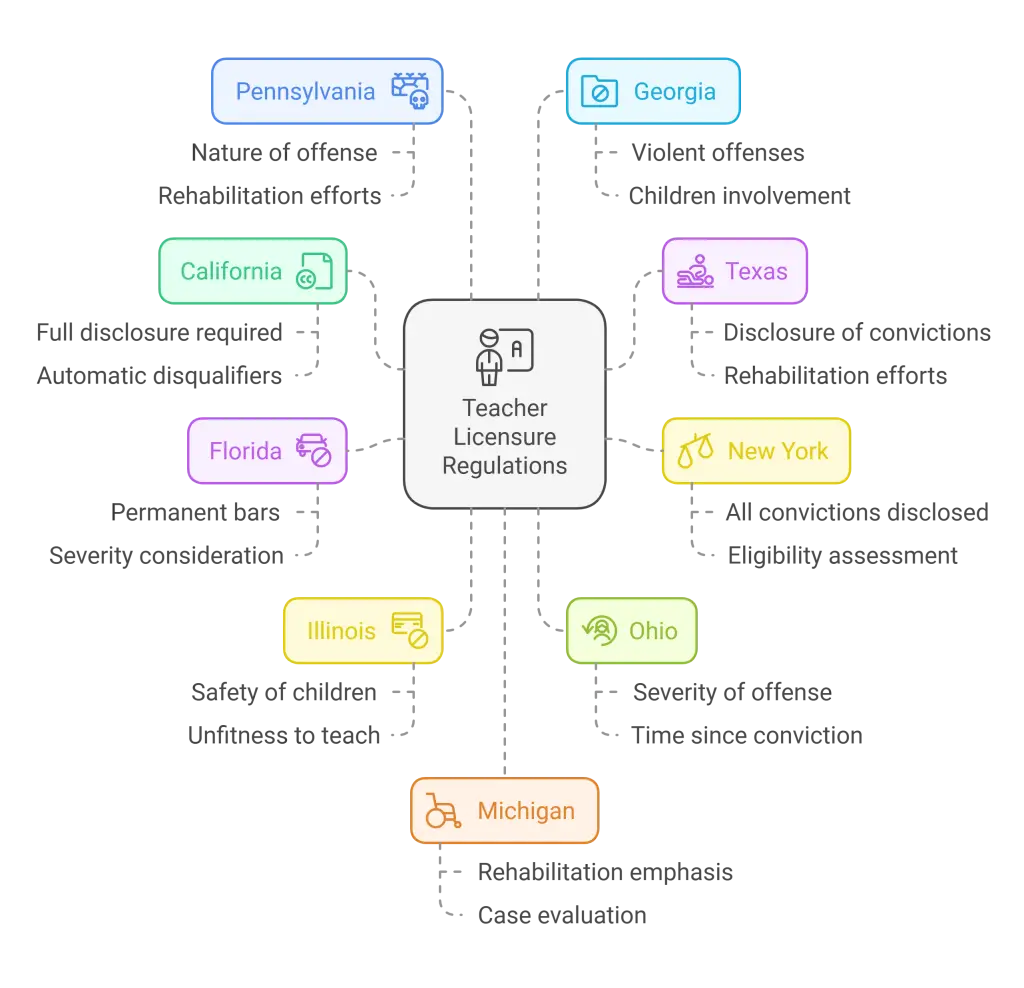Becoming a teacher with a misdemeanor is often possible, but regulations vary widely by state. Each state has its own set of rules and guidelines that determine if a misdemeanor will affect your eligibility for a teaching license. Key factors include the nature of the misdemeanor, the state's legal requirements, the time since the conviction, the school district's hiring policies, and demonstrated rehabilitation efforts. Understanding these variables can help you navigate the path to becoming a teacher despite having a criminal record. This guide provides a comprehensive overview to help aspiring educators understand the impact of a misdemeanor on their teaching career. It also outlines the steps to take if you have a misdemeanor.
Key Takeaways
- Misdemeanors Do Not Automatically Disqualify: Having a misdemeanor does not automatically disqualify you from becoming a teacher, but the nature and severity of the offense, as well as state laws, play crucial roles.
- State Laws Vary: Different states have varying regulations regarding misdemeanors and teaching eligibility. It's essential to understand the specific laws in your state.
- Case-by-Case Basis: School districts often evaluate applicants with misdemeanors on a case-by-case basis, considering the context of the offense and any rehabilitation efforts.
- Disclosure is Key: It's important to be transparent about any criminal history during the application process, as failing to disclose a misdemeanor could lead to disqualification.
- Appeals and Legal Remedies: If a misdemeanor is impacting your teaching career, there may be legal options available, such as expungement or appealing a disqualification decision.
Introduction
When aspiring to become a teacher, having a clean background is often seen as a critical requirement. However, life is complex, and many individuals with a passion for education may have past misdemeanors that they fear could hinder their career aspirations. The question then arises: Can you still pursue a teaching career if you have a misdemeanor on your record? This concern is not uncommon, and understanding the implications of a misdemeanor in the context of teaching can help clarify your path forward.
In this article, we explore how misdemeanors affect your eligibility to become a teacher, delving into the legal considerations, state-specific regulations, and the importance of transparency during the application process. By gaining insight into how misdemeanors are assessed in the teaching profession, you can better navigate your career journey and make informed decisions about your future in education.
The path to any career is not always straightforward. Misdemeanors can impact anyone's career journey, especially in the field of teaching. As HR professionals, our role is not just to tick the disqualification box but also to treat each individual as someone more than their wrong decisions in the past. Transparency is key in this process and candidates who disclose their past and genuinely show personal growth often demonstrate qualities that can make them exceptional educators. In instances like this, it is important to have a keen eye for someone who can contribute wholeheartedly to the future of our children through the field of education.
Factors Influencing Teacher Eligibility with a Misdemeanor
Type of Misdemeanor
The type of misdemeanor plays a significant role in determining your eligibility to become a teacher. Minor offenses, such as traffic violations and public intoxication, rarely disqualify individuals from teaching positions. These offenses are generally viewed as less severe and not indicative of a person's overall character. On the other hand, serious misdemeanors, including assault, theft, and drug offenses, often raise concerns among hiring committees and licensure boards. These offenses may suggest a pattern of behavior that could be deemed unsuitable for a teaching environment. Offenses against children or involving moral turpitude are generally disqualifying in most states, as they directly conflict with the responsibilities and trust placed in educators. These offenses typically lead to automatic disqualification from obtaining a teaching license.
State-Specific Regulations
Each state has different regulations regarding teacher licensure as a misdemeanor, so it's crucial to understand your specific state's requirements.

California
Full disclosure of all convictions is required. Certain offenses, like crimes against children, are automatic disqualifiers, while others are evaluated case-by-case. The California Commission on Teacher Credentialing reviews each application and considers the severity and recency of the misdemeanor. More details here: California Commission on Teacher Credentialing
Texas
Applicants must disclose any convictions from the past 10 years. Certain offenses, such as assault and DWI, trigger a review process by the Texas Education Agency. The agency considers the nature of the offense and any rehabilitation efforts made by the applicant. More details here: Texas Education Agency
New York
All convictions must be disclosed, and the State Education Department determines eligibility on a case-by-case basis. The department assesses the impact of the sentence on the applicant's ability to perform teaching duties safely and effectively. More details here: NYSED Office of Teaching Initiatives
Florida
Some misdemeanors, such as battery, permanently bar individuals from obtaining a teaching license. The Florida Department of Education has strict guidelines and considers the severity and relevance of the offense to the teaching profession. More details here: Florida Department of Education
Illinois
Misdemeanors may not disqualify applicants unless they relate to the safety of children or demonstrate unfitness to teach. The Illinois State Board of Education evaluates each case individually, considering the nature of the offense and any subsequent rehabilitation. More details here: Illinois State Board of Education
Ohio
All criminal convictions must be reported. The Ohio Department of Education reviews each case individually, considering factors such as the severity of the offense, the time elapsed since the conviction, and evidence of rehabilitation. Certain offenses, like those involving children, may lead to automatic disqualification. More details here: Ohio Department of Education
Pennsylvania
Full disclosure of all criminal convictions is required. The Pennsylvania Department of Education reviews each application, focusing on the nature of the offense and any rehabilitation efforts. Some misdemeanors, particularly those involving moral turpitude or harm to children, may result in disqualification. More details here: Pennsylvania Department of Education
Georgia
Applicants must disclose all criminal convictions. The Georgia Professional Standards Commission evaluates each case based on the severity of the offense, the time since the conviction, and evidence of rehabilitation. Some offenses, particularly those involving violence or children, may lead to disqualification. More details here: Georgia Professional Standards Commission
Michigan
All criminal convictions must be disclosed. The Michigan Department of Education reviews each case individually, considering factors such as the severity of the offense, the time elapsed since the conviction, and any rehabilitation efforts. Certain offenses may result in disqualification, particularly those involving children or violence. More details here: Michigan Department of Education
Virginia
Full disclosure of all criminal convictions is required. The Virginia Department of Education reviews each application on a case-by-case basis, considering the nature of the offense and any evidence of rehabilitation. Certain offenses, particularly those involving children or moral turpitude, may lead to disqualification. More details here: Virginia Department of Education
Time Elapsed & Rehabilitation
The time elapsed since the conviction is another critical factor in determining teaching eligibility. Recent convictions are generally considered riskier than older ones, as they may suggest ongoing behavioral issues. Conversely, older convictions, especially those followed by a period of good behavior, are often seen as less concerning. Demonstrating positive changes, such as participating in counseling, community service, or other rehabilitation efforts, can significantly strengthen your case. Evidence of personal growth and changed behavior shows that you have taken steps to address past mistakes and are committed to maintaining a positive, law-abiding lifestyle. Rehabilitation efforts are particularly important in demonstrating to licensing boards and hiring committees that you can serve as an educator.
School District Discretion
School districts often have their own set of policies regarding hiring individuals with a criminal record. These policies can sometimes be stricter than state regulations. Some districts may have a zero-tolerance policy for certain misdemeanors, while others may be more lenient. It's essential to research the specific policies of the school district you are interested in to understand their stance on hiring individuals with a misdemeanor. In some cases, district-specific regulations may require additional disclosures or background checks. Understanding the district's policies can help you better prepare your application and address any potential concerns upfront.
Steps for Aspiring Teachers with Misdemeanors
- Thoroughly Research Your State's Laws: Consult the Department of Education website for your state. Understanding the specific regulations and requirements can help you determine your eligibility and prepare accordingly. Each state's website typically provides detailed information about the application process, required disclosures, and potential disqualifiers.
- Disclose Your Conviction Honestly: Honesty is crucial during the application process. Failing to disclose a conviction can lead to immediate disqualification or revocation of your teaching license if discovered later. Being upfront about your past demonstrates integrity and a willingness to take responsibility for your actions.
- Highlight Rehabilitation Efforts: Provide evidence of personal growth and changed behavior. This can include participation in counseling, community service, educational achievements, or letters of recommendation from reputable sources. Demonstrating your commitment to personal development can help mitigate concerns about your past.
- Consider Legal Counsel: Consulting with an education law attorney can help clarify your options and rights. An attorney can also guide you through the application process, help you understand state-specific regulations, and address legal challenges.
Additional Tips
Expungement
If eligible, seeking expungement or record sealing may improve your chances of obtaining a teaching license. Expungement can remove the conviction from your record, making it less likely to impact your eligibility. The process and eligibility criteria for expungement vary by state, so it's essential to research your state's specific requirements.
Alternative Certification
Some alternative certification programs may be more forgiving of past offenses. These programs often address teacher shortages and may have eligibility criteria different from traditional certification routes. Exploring these options can provide additional pathways to becoming a teacher.
Frequently Asked Questions
Can a misdemeanor disqualify you from becoming a teacher?
Yes, a misdemeanor can disqualify you from becoming a teacher. Factors that affect this include the type of misdemeanor, state regulations, and school district policies. Minor offenses are less likely to disqualify you, while serious misdemeanors, especially those involving children or moral turpitude, are more likely to be disqualifying.
How can I improve my chances of becoming a teacher with a misdemeanor?
To improve your chances of becoming a teacher with a misdemeanor, be honest about your conviction during the application process. Highlight your rehabilitation efforts, such as counseling or community service. Seek expungement if eligible and provide evidence of personal growth and positive changes.
Do all states require disclosure of misdemeanors when applying for a teaching license?
Yes, most states require you to disclose all criminal convictions, including misdemeanors, when applying for a teaching license. The level of scrutiny and specific regulations vary by state, so research your state's requirements thoroughly.
Can a school district have stricter policies than state regulations regarding misdemeanors?
Yes, school districts can have stricter policies than state regulations. Some districts may have a zero-tolerance policy for certain misdemeanors, while others may be more lenient. It's important to research the specific policies of the school district you are interested in.
Is expungement an option for improving my chances of becoming a teacher with a misdemeanor?
Yes, expungement can improve your chances of becoming a teacher with a misdemeanor. If eligible, expungement can remove the conviction from your record, making it less likely to impact your eligibility. The process and eligibility criteria for expungement vary by state.
Conclusion
Teaching with a misdemeanor is possible but requires navigating state-specific hurdles and demonstrating rehabilitation efforts. Proactive research into your state's laws and school district policies is essential. Emphasizing personal growth and being honest throughout the application process can enhance your chances of success. Despite the challenges, with determination and the right approach, you can pursue a fulfilling career in education.
Take the Next Step with GCheck
If you have a misdemeanor and are considering a teaching career, GCheck can help. Our comprehensive background check services provide detailed insights into your record, helping you understand your standing and improve your chances of success. Visit GCheck today to learn more and take control of your future in education.

GCheck Editorial Team
Meet the GCheck Editorial Team, your trusted source for insightful and up-to-date information in the world of employment background checks. Committed to delivering the latest trends, best practices, and industry insights, our team is dedicated to keeping you informed.
With a passion for ensuring accuracy, compliance, and efficiency in background screening, we are your go-to experts in the field. Stay tuned for our comprehensive articles, guides, and analysis, designed to empower businesses and individuals with the knowledge they need to make informed decisions.
At GCheck, we're here to guide you through the complexities of background checks, every step of the way.







